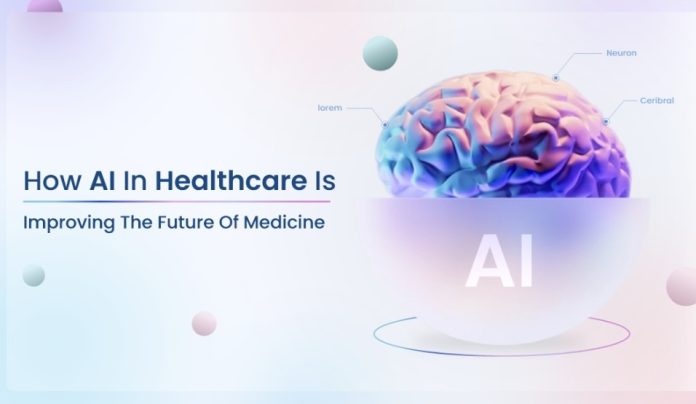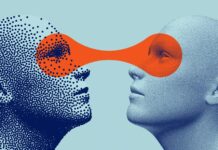As technology continues to evolve, Artificial Intelligence (AI) has become a major force in the healthcare industry. AI is revolutionizing the way we diagnose and treat patients, and its potential for improving the future of medicine is tremendous.
In this blog, we’ll explore how AI is being used to improve healthcare and discuss the implications for the future of medicine.
So, let’s get started!
AI In Healthcare – The Current Scenario
AI in healthcare is already being used in a variety of ways to improve patient care and efficiency. Let’s explore the uses of AI in the current Healthcare scenario.
- AI-driven technologies are helping doctors to diagnose and treat patients more accurately and quickly than ever before.
- AI is being used for medical imaging, such as X-rays and MRIs, to identify diseases and anomalies in the body.
- AI is also being used to help with drug discovery, using machine learning algorithms to identify potential treatments for diseases.
- AI can be used to sift through vast amounts of data quickly to uncover patterns and trends that would otherwise be difficult to detect.
- AI is being applied to health care applications such as voice recognition for virtual assistants, natural language processing for patient data entry and analysis, and predictive analytics for disease diagnosis and prognosis.
- Artificial Intelligence can also be used to monitor patient vital signs and make recommendations on treatments based on this data.
- Finally, AI can be used to automate administrative tasks such as scheduling appointments and tracking medical records.
Benefits Of AI In The Healthcare Industry
AI in healthcare has a number of benefits that can help make the medical industry more efficient and accurate. Here are just a few of the advantages of AI in healthcare:
-
Improved Diagnostics
Artificial Intelligence can process large amounts of data quickly and accurately to diagnose diseases, allowing for faster and more precise diagnoses. AI can also be used to compare a patient’s symptoms with a vast database to arrive at a more accurate diagnosis than a physician alone could.
-
Enhanced Treatment
AI can also be used to develop personalized treatments for patients by analyzing their medical history and creating treatment plans tailored to their specific needs. This allows physicians to provide better care for their patients.
-
Automated Tasks
AI can automate mundane tasks, such as collecting patient information, tracking medical records, and creating reports. By freeing up time for doctors and nurses, AI enables them to focus on more important tasks, such as providing quality care for their patients.
-
Improved Patient Outcomes
AI in healthcare can also be used to predict potential outcomes of a treatment plan or disease progression. This can help physicians make better decisions and provide better care for their patients.
-
Cost Savings
AI in healthcare can also lead to cost savings. Automating processes can reduce costs associated with labor and increase efficiency by streamlining processes and reducing errors. Henceforth, if you also want to save money, then you can hire app developers India, and get AI-driven healthcare solutions to ease up your workload.
-
Increased Accessibility
AI can enable doctors to provide care to remote areas or those with limited resources, making quality healthcare accessible to more people.
-
Data Analysis
AI can be used to analyze large volumes of data quickly and accurately, helping researchers make more informed decisions about treatments and medications.
Artificial Intelligence is already being used in the healthcare sector today, but it is likely that its use will only increase as technology advances and our understanding of how it works improves.
AI Will Help Healthcare Sector Grow Exponentially – Here’s How!
Artificial Intelligence can help healthcare providers in a variety of ways. Some of these ways are:
- Drug Discovery: AI can help researchers discover new drugs faster and more efficiently than traditional methods. It can also identify new uses for existing drugs and help repurpose them for other conditions.
- Precision Medicine: AI can help doctors customize treatments based on the patient’s unique characteristics, such as genetic makeup, medical history, and lifestyle. This personalized approach can improve patient outcomes and reduce the risk of adverse reactions.
- Medical Imaging: AI can analyze medical images such as X-rays, CT scans, and MRI scans, and help doctors identify potential health issues that might be missed by human interpretation. As per the top Android app development company, AI can help with faster and more accurate diagnoses, which in turn can lead to more effective treatments.
- Patient Monitoring: Artificial intelligence (AI) can constantly track patients and warn healthcare personnel about possible health risks before they become critical. This has a chance to reduce hospital readmissions and enhance patient outcomes.
- Clinical Trials: AI can help researchers design clinical trials more efficiently and identify the right patient populations for the trials. This can hasten drug research and bring innovative medicines to market sooner.
Now, let us look at some of the emerging trends of AI in the healthcare sector.
Emerging Trends Of AI In Healthcare
Artificial Intelligence is playing an increasingly important role in healthcare, with more applications being developed every day. Here are some of the most significant emerging trends in AI in healthcare.
- Wearable Sensors: Wearable sensors are becoming more advanced, offering reliable data tracking and analysis that can provide medical professionals with real-time information about a patient’s health. Wearable sensors are able to monitor vital signs such as temperature, heart rate, and respiration, and provide early warning signs for potential health issues.
- Diagnostic Tools: AI is being used to develop diagnostic tools that can accurately assess a patient’s health and identify diseases. AI-based tools are able to quickly and accurately analyze medical data, such as images or lab results, to identify potential health issues.
- Drug Discovery: AI-based systems are being used to speed up the process of drug discovery and development. The best healthcare app development services provider stated that machine learning algorithms can be used to analyze vast amounts of data and identify potential drug targets faster and more accurately than traditional methods.
- Remote Care: AI-based technologies are also helping to improve remote care and provide patients with better access to healthcare services. AI-powered applications can be used to connect patients with medical professionals remotely and provide real-time health monitoring.
- Medical Imaging: AI is being used to improve the accuracy of medical imaging. AI-based systems can identify potential abnormalities in scans more quickly and accurately than traditional methods. This can help doctors to diagnose conditions more quickly and accurately, leading to improved patient outcomes.
Conclusion
Artificial Intelligence in healthcare is revolutionizing the way we deliver healthcare services. AI in healthcare has the potential to improve access to care, increase the efficiency of care delivery, and even improve outcomes for patients.
With these potential benefits, it is clear that AI in healthcare will play a major role in the future of medicine. Therefore, it is the best time to get in touch with the best AI app development company and get your healthcare systems integrated with Artificial Intelligence.


































